Highlights from Kirrin Medcalf’s evidence
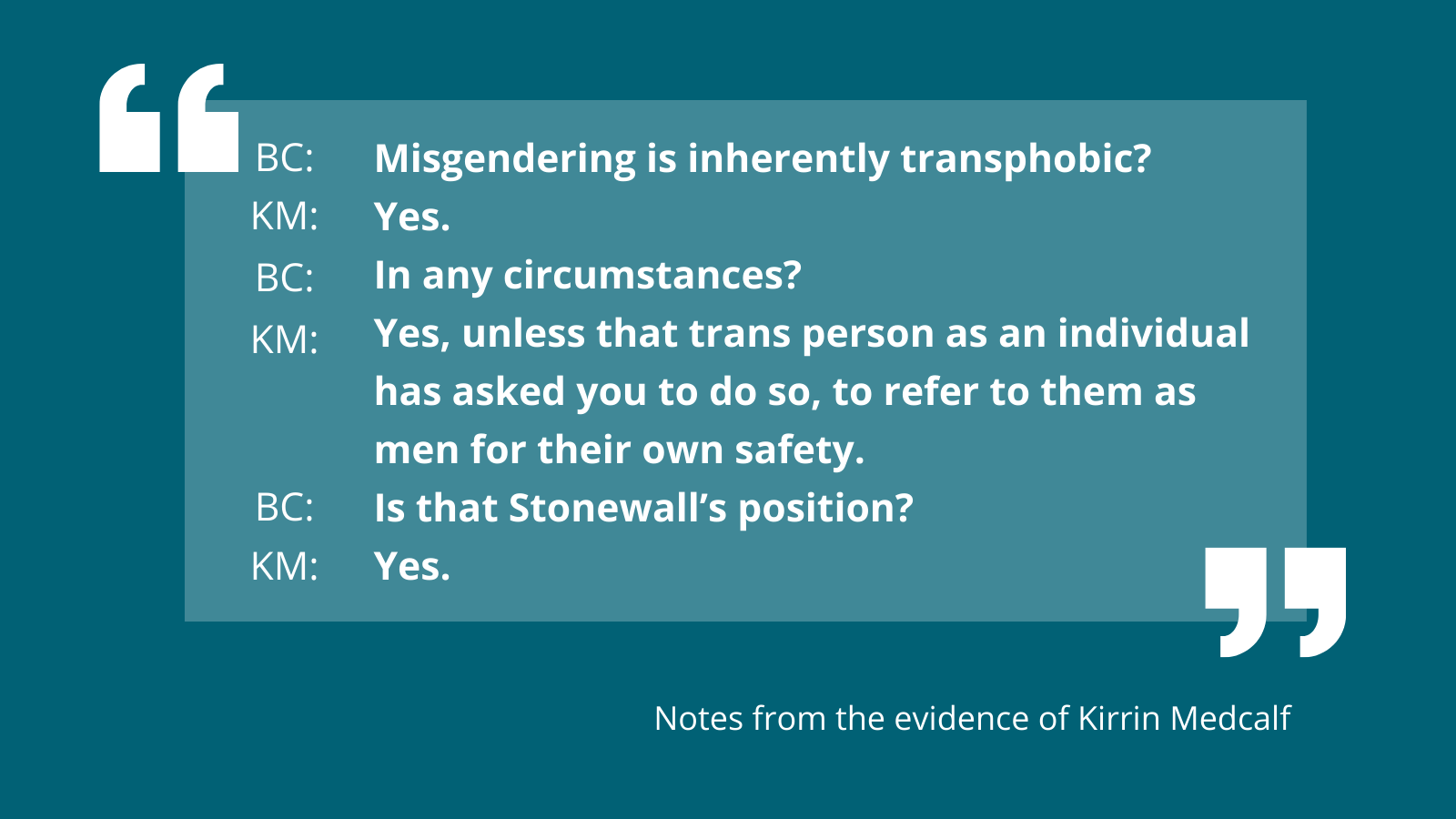
From our live notes of the evidence of the Allison Bailey v Stonewall Equality Limited and Garden Court Chambers Case – cross-examination of Kirrin Medcalf, 10th May 2022 (all screenshots are from documents in the public domain).
Background: Kirrin Medcalf had been employed by Stonewall as its head of trans inclusion for just five weeks when the tweets that most of the hearing was about were sent. Medcalf managed the person in charge of the Stonewall trans advisory group, or STAG, a collection of representatives from other organisations and Stonewall itself. Its members were not paid by Stonewall, but Stonewall paid expenses for meetings, and arranged those meetings. The group consisted of between 15 and 20 “critical friends”, who were tasked with helping Stonewall, which adopted a trans-related mission only in 2015, to catch up. It was supposed to provide Stonewall with trans-related expertise, and to enable Stonewall’s own trans inclusion team to gain credibility with other trans groups and people, and to build up connections with them.
Medcalf was called to give evidence because of an extraordinary email sent on 31st October 2019 to the three heads of chambers at Garden Court, and cc’ed to others.
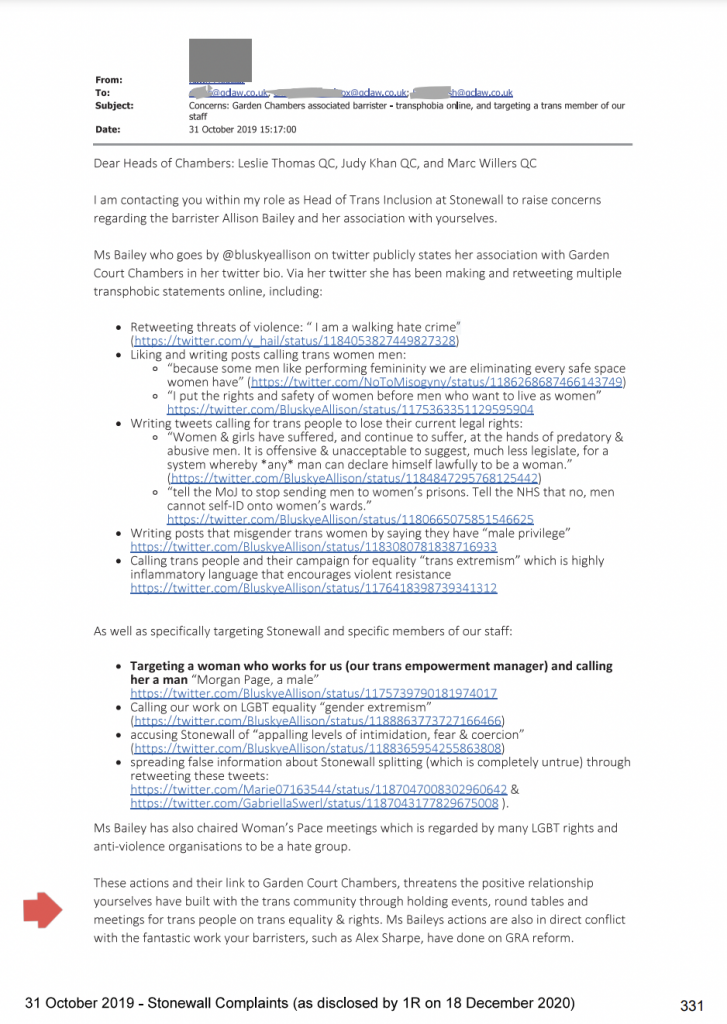
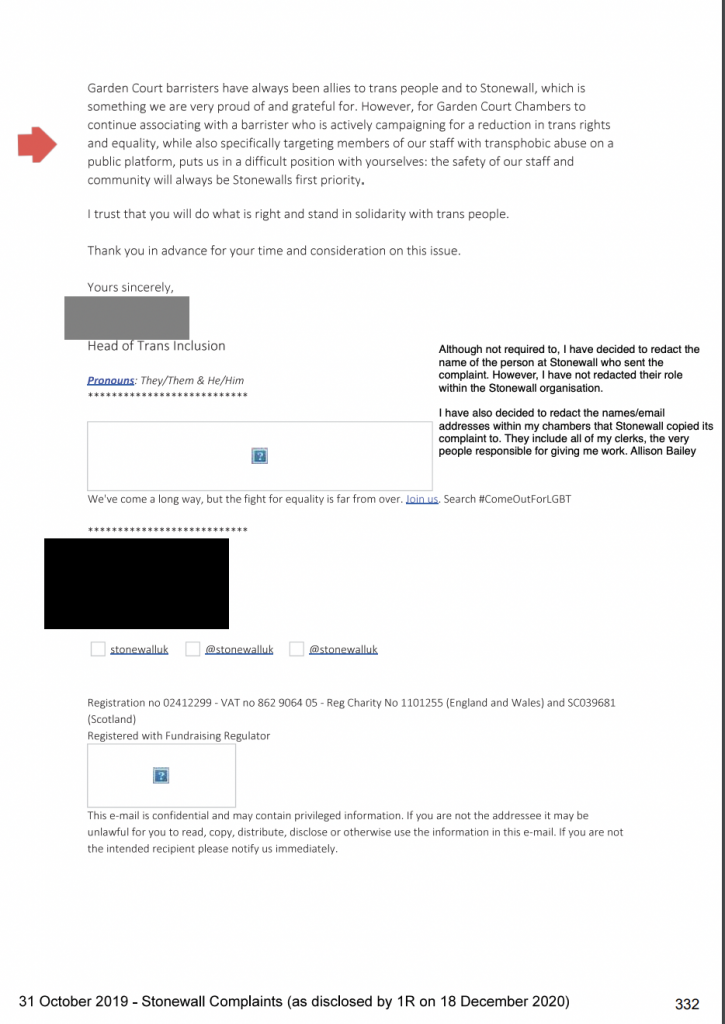
Medcalf’s email and Medcalf’s explanations of what precisely was “transphobic” about Bailey’s tweets together demonstrate Stonewall’s organisational beliefs.
Ben Cooper QC, Bailey’s barrister, set out the viewpoint of “gender-critical feminists” thus: “Sex is the thing at conception, birth and throughout life, and gender is different.” He also put the proposition that “TERF” is a slur, and is often used in conjunction with sexualised insults and threats against women.
KM: It describes a subset of people who use TERF for themselves. We always try to use the terminology people use for themselves.
BC: I’ll take you through a number of examples.
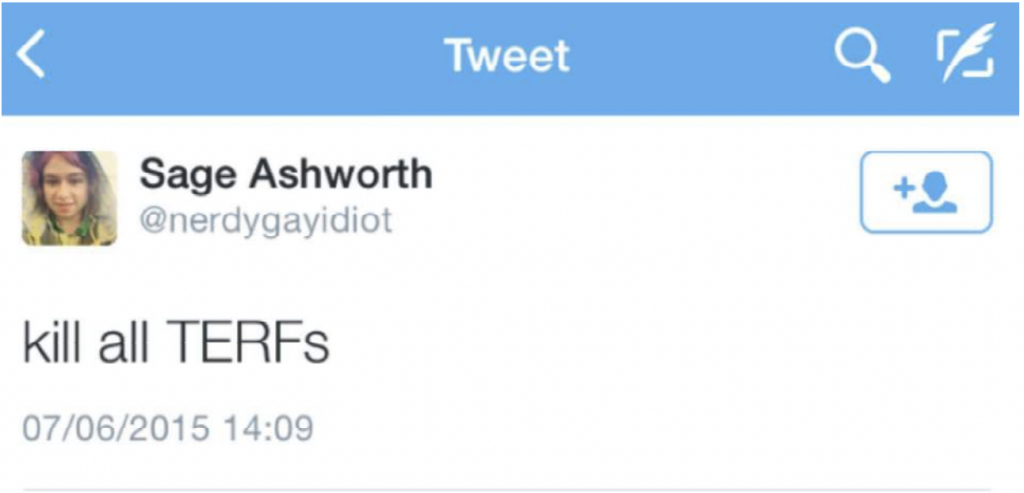

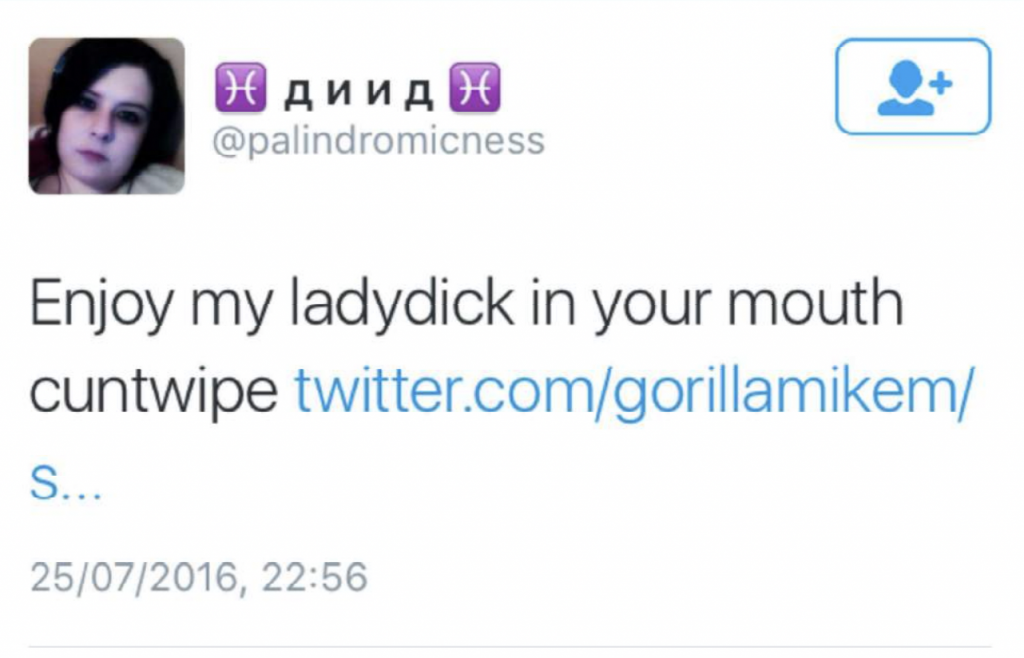
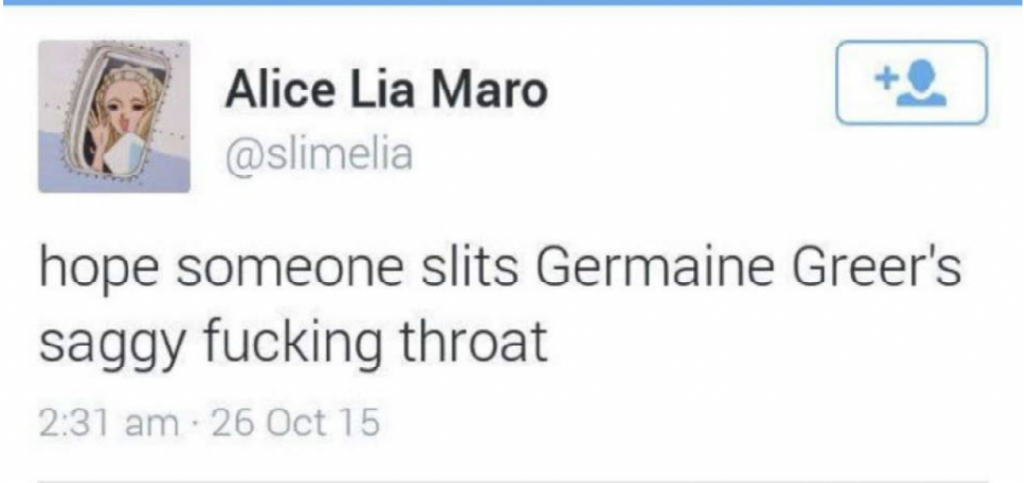

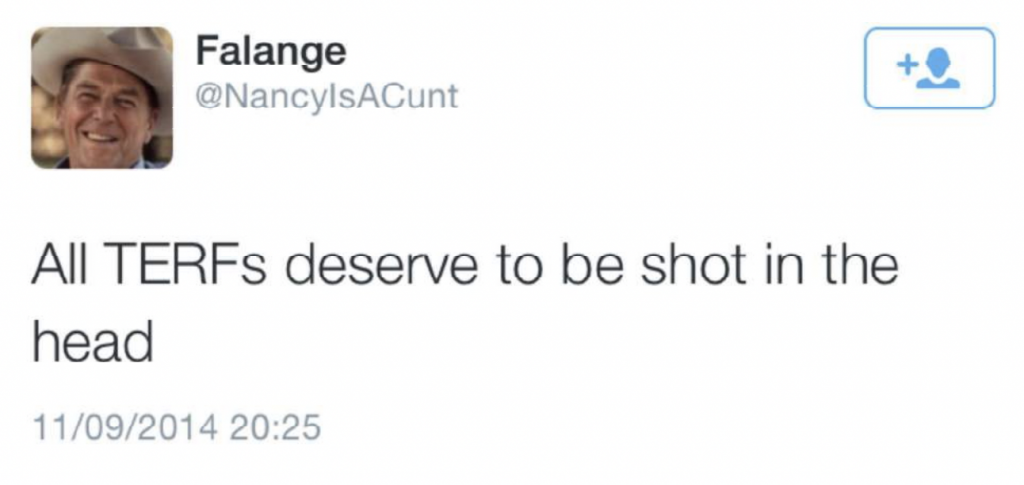
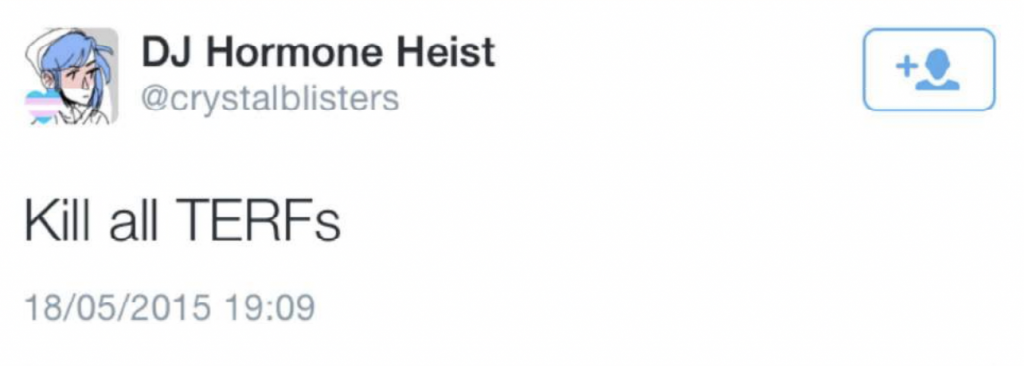
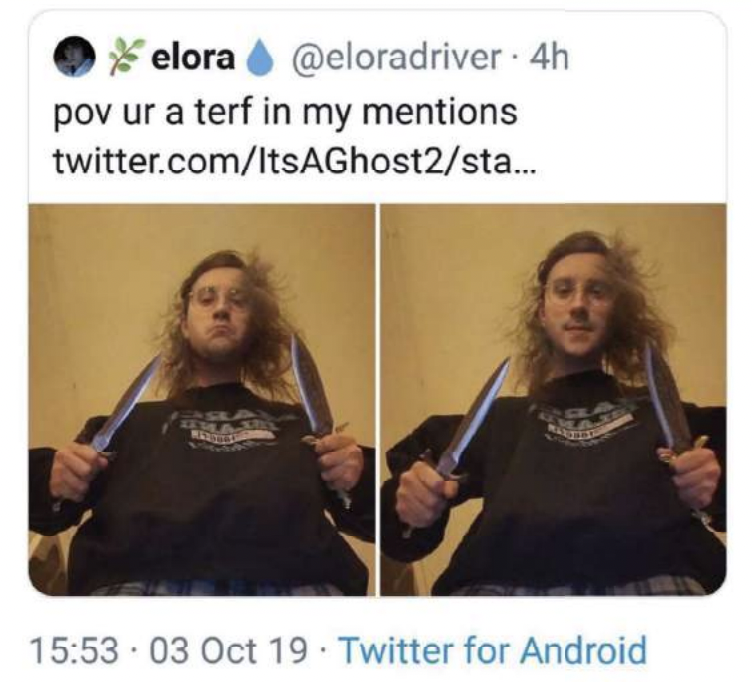
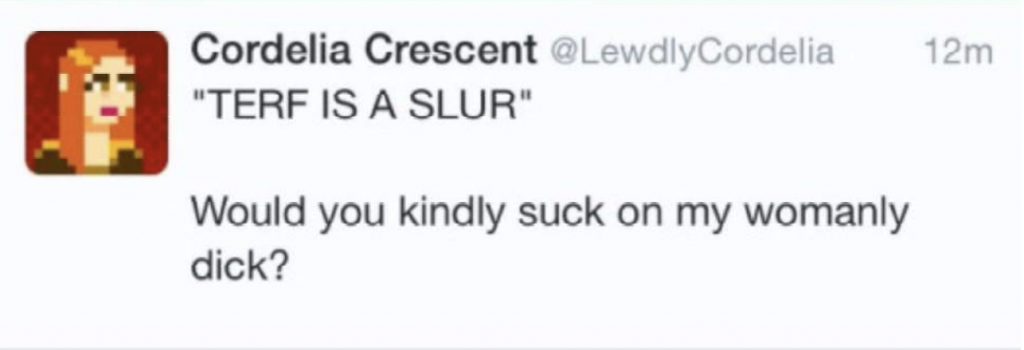

KM: They are not reflective of trans communities. I disagree specifically with the word [TERF], that it often accompanies abuse. On the internet you can generally find someone saying anything. There are instances when there’s abuse, but it’s not the norm. It’s normally used by a minority, who are a minority in power as well as numbers; as a shorthand talking about people who are oppressing and harming them and that’s how it’s used in general, to talk about the people who are oppressing in power. So, a majority oppressor… the community uses it as shorthand to talk about the radfem community who seek to have trans people removed from those communities.
BC: For the moment, look at the usage of term TERF in the third entry down, fuck the fuck off you fucking terfy terfs, in middle of page, there is terfs, transfemms do not belon…..transphobia, and stop being and then there’s a picture that’s been removed. At 10.04, this is terf bullshit, turn over the page…
KM: I’m really lost on where we are.
BC: One more example, 3583, fifth entry down concludes ‘fuck right off’, and so it goes on. This I suggest to you Mr M was not an aberration, an out of the ordinary, but a type of response that people who express views such as the claimant’s can expect to see on Twitter?
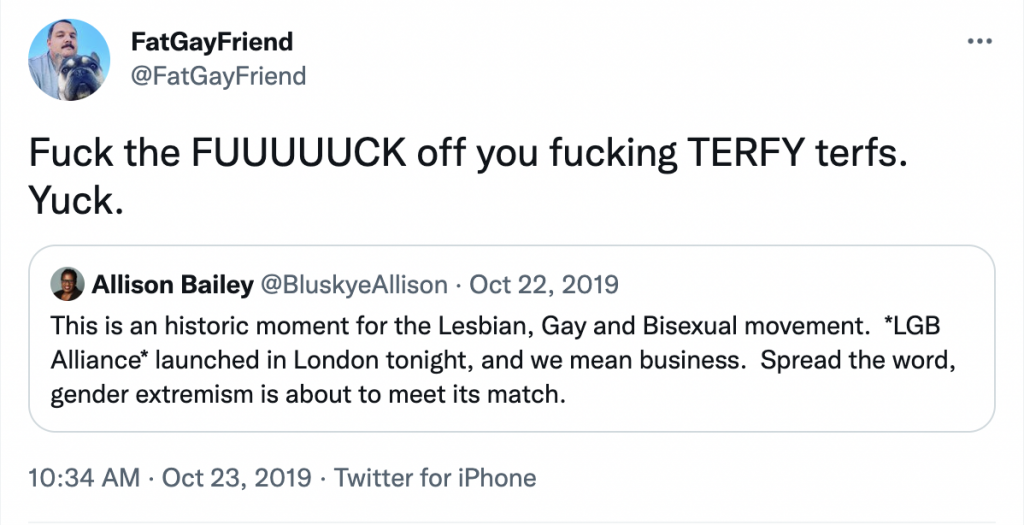
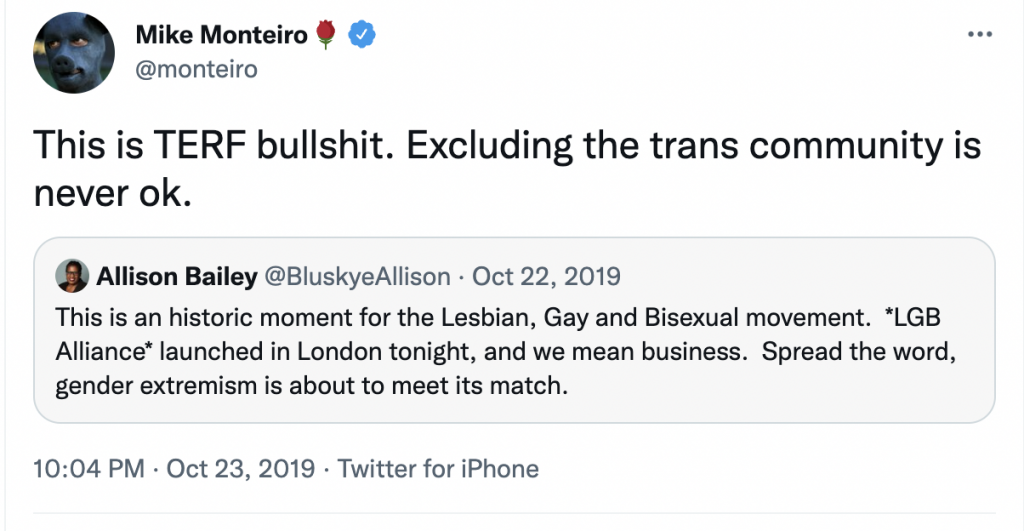
KM: These are very much different to the ones you showed elsewhere with threats of violence. These are people responding to someone who’s actively trying to harm them. To a minority of trans people and yeah, people who would be angry and have the right to respond in that way. So yes, some of them use the term; others use gender-critical, others use transphobe, they’re just trying to, in the short amount of words you’re limited to in Twitter, to explain why they’re particularly unhappy with this perspective and expressing their displeasure with it.
TERF isn’t a slur here, it’s people being angry. Just because they’re angry it doesn’t mean it’s a slur. A slur has to have a connotation from a majority in power to a minority in power. For example, ‘cracker’ is a slur because white people have the power and black people don’t. TERF is people in power wanting to harm others, rather than being a word that’s someone in power to oppress someone else. Trans people don’t have the power. Trans people are a minority in power.
[Questions about Stonewall’s lobbying on the sex question in the census.]
| Page 3846 – Bundle: notes from a meeting of the Trans Organisations Network, held at Garden Court Chambers ONS Census, England [Redacted]: Stonewall Q: is your gender the same as your sex registered at birth? Pushing back on second question as a gender identity question. Sex or gender identity question? Unlikely the questions are going to change but we have potential impact on guidance Josh/Stonewall to put together notes for a response Concerns expressed re: intersex inclusion Trans History question. Would it be answered appropriately? Josh: online census 2021 will have functionality to click through to guidance Main concern is note that goes along the ‘sex’ question as it emphasizes there is a difference between sex and gender; this was challenged and encourage ONS to make this point more clear (not to collect data on sex assigned at birth) ONS doing surgeries to trial census Wales likely to follow England overall Scottish situation: trans critical agenda: only sex (at birth) is recorded and not gender, ie. TERFS want ‘legal sex’ Our response ‘lived sex’ but unlikely to be included. Scotland ‘trans’ less contentious, so likely the second question will be an identity question. Scottish Parliament consensus driven. Westminster less. Helen Belcher: ONS uses will become ‘best practice’ for questionnaires so this is hugely important. Josh Bradlow update on process in Parliament: bill passed that sex/gender questions are voluntary: We need to be proactive – learn from what happened in Scotland. Q: ‘male, female or transgender?’ [Redacted] survey: What is the purpose of the survey? Concern: masquerading as Council or Govt? [Redacted] solution change ‘transgender’ to ‘other’?? NHS [Redacted]: piece of work done by NHSX – strategic version of NHS digital – Local Health and Care Records that allows them to develop new ways of data in people’s care records. Want to overhaul data collection/trans people. Round tables with trans communities have been held. GEO Stonewall: trans status monitoring standard across govt in process (no more intel) AoB: Change to contribute now Via Michelle Brewer, Garden Court chambers: Shaan Knan Community encouraged to write to Garden Court Chambers Heads in the next couple fo days to express concern about Allison Bailey’s (barrister) transphobic comments on Twitter. Chambers having a meeting to decide on formal action against barrister Allison Bailey. Shaan to send an email to round table participants. |
BC: Your view is that to deny a trans person is literally the sex with which they identify [is transphobia]?
KM: Yes, to deny people to live reality and seek to erase their existence on government records is an act of transphobia.
BC: Mr M, it is in your view correct that the opinion that sex and gender are different things, and that therefore the census should ask a question limited to sex amounts to erasing trans people’s identities.
KM: No, I think you quite misunderstood my points. So within the context we’re talking here, we’re talking about wanting… Previously trans people were able to answer in any way they wanted to reflect their lived reality. And what was being done here was to remove that and only putting gender assigned at birth, or sex assigned at birth, however you want to use that word. And that was what, in my belief, would erase trans people’s ability to reflect who they were on the census and how they live their lives on the census. And sometimes you’re making people, removing what’s been set out in the GRA act 2004, puts them in a particular legal thing, but you were misunderstanding my perception.
BC: Can I go back – I’m not asking about the term as it appears on the page in front of you, the question I put to you originally is: your position is that the view that someone’s sex is not the same as their gender identity, is inherently transphobic.
KM: Let me just, can I repeat the question back, that my position is, if someone views someone’s sex as their gender, that is transphobic?
BC: The gender-critical view that someone’s sex is a biological thing, a characteristic that is not changed or affected by gender identity, you regard that as inherently transphobic?
KM: I’d say that is a view that I think is incorrect, I wouldn’t say necessarily, I’d perceive situations where that belief would be motivated by transphobia, but in many cases it would be… it’s just a matter of biological sex is made up of a multitude of characteristics that change over a person’s life-cycle.
BC: Your view is that to argue that trans people should not be … [included in everything that is for the sex they identify as, is transphobic].
KM: No I disagree, so for example if a service was a cervical screening service, wanted to allow men to access their service because trans men needed to access it and that’s OK backed up by 2010 EqA, it depends on situation, motivation, aimed at helping people not removing legal [rights?].
BC: Your view is certainly that “transwomen should not be given access to certain single sex spaces, toilets, changing rooms, rape crisis centres” is inherently transphobic.
KM: I agree with that. It is transphobic, and I take issue with the words “allowing access”. It’s about removing access, removing a certain section of women from services because they are trans.
BC: Misgendering is inherently transphobic?
KM: Yes.
BC In any circumstances?
KM: Yes, unless that trans person as an individual has asked you to do so, to refer to them as men for their own safety.
BC: Is that Stonewall’s position?
KM: Yes.
BC: Your view is that describing any particular transwoman as male, apart from that one exception, is misgendering and inherently transphobic?
KM: Yes and I’d add abusive to that as well.
BC: And that’s Stonewall’s position?
KM: Yes, I believe so.
The Times article by Nicholas Hellen was discussed.
KM: No, my complaint about the tweet was around posing Stonewall as intimidation, fear and coercion, and what that would reflect on any trans colleagues who would access that space and… coercing people. It wasn’t about the article but saying intimidation, fear and coercion. Anyone walking into that building with [the label] Stonewall attached to them would potentially be seen as a threat. And what could happen to that person by someone seeing them as a threat.
EJ: Are you saying Garden Court as a threat or the other way round?
KM: Not Garden Court as a whole, but whether Allison Bailey would perceive anyone who worked for Stonewall and was then entering that space, mutually shared space, as potentially being intimidating, causing fear or somehow being coercive because of their association with Stonewall. It’s not the article, but my concerns were about those words: Stonewall, intimidating people, fear and coercion. And Stonewall is its employees, that’s the people who would be causing intimidation and coercion. I didn’t need to read the article, the media puts its own perspective. My concerns were literally the terms intimidation and coercion. That, in the context of everything else, raised concerns for me about how me or my staff would be perceived if we came into contact with Allison Bailey.
KM: What I was writing about was my safety concerns about myself, my team and potentially any trans person attending an event there. It was not about the newspaper article or what she said there.
KM: I would have said someone who is targeting a member of our staff online, who is going to be in a workplace that we are going to use. and I wouldn’t have said much more than that unless [??]
I recall that in a later conversation with Laura, she said: crossed wires, I would have said don’t send that email. I didn’t explain that clearly enough. I didn’t understand the context, that was a conversation six months later…
[This is about how vague Kirrin’s communications with other people in Stonewall were.]
KM: I obviously did mention it to Laura. It was brought up, it was a safety concern. Part of my role is to search for names of my team on social media. It’s so damaging to their mental health to look at this horrible and damaging stuff that’s being said of them. I keep a record and identify security concerns. There are many posts and tweets about these two individuals that were being recorded at the time. Discussions about that and what we would do in a situation. It was mainly that we wouldn’t act on anything unless there was a chance where that other person had physical access to harm her.
BC: A news story in which Center Parcs had declined access to single-sex facilities to a transwoman until she had fully transitioned.
KM: I object. There’s no such thing as fully transitioned.
BC: I understand but I’m just quoting. Page 553 is an inset quotation from the briefing document in which the media team is drafting a letter from Paul Twocock to send to Center Parc’s CEO. The hope is they will change their mind before the issue gets bigger. On this issue it was not a letter of support. It was a letter telling them to change their position.
KM: It was telling them what the EA2010 says. There’s nothing there about physical attributes.
BC: Let me suggest it’s quite obvious what this means. Stonewall’s position is that “adult human female” is transphobic.
KM: It’s used within transphobic circles, yes.
BC: Because this person defines themselves as an adult human female, they’re transphobic?
KM: They are identifying themselves as holding transphobic beliefs and willing to inflict hate crimes on others.
BC: It’s not saying that they’re either doing or experiencing hate crime, it’s about the definition “adult human female” as being interpreted as a hate crime.
KM: For something to be a hate crime there has to be an original crime with the hate an inflection on it, so saying that [adult human female] isn’t a crime.
BC: There’s nothing about the claimant’s retweeting of this tweet to suggest that she would inflict hate crime on anyone
KM: Not this one, it’s about compiling future risks and what could happen. This was one part of what made me think this would happen.
BC: Because like some men like performing femininity [another tweet]
Men who want to…. [another tweet]
BC: Do you understand that, in both, the beliefs being expressed are about safe spaces for women, and the gender-critical viewpoint necessarily involves distinguishing between women and men who identify as women?
KM: From my point of view, she is saying that transwomen are threats.
BC: In terms of you giving it as an example, is it your view that gender-critical views are inherently transphobic?
KM: These views make me concerned as how transwoman existing in a space is interpreted as violent, and violence is often an answer to that. That’s my concern. That by transwomen existing in a space they are removing safety from other women.
BC: We don’t have the time to go through the detail of this. It is not the position that these either explicitly or implicitly suggest that transwomen are necessarily a threat. What they are talking about is safe spaces for women and women’s rights, and the implications of redefining women to include men who identify as women.
KM: No, this is about removing transwomen. They are and always have been women and removing them… It’s about a transwoman being in a women’s space where she has always had that right.
BC: I’ll suggest two ways it’s not inherently transphobic. One is that a reason safe spaces exist for women is that men are disproportionately violent towards women.
KM: All women, including transwomen, experience violence specifically from cisgender men.
BC: One of the concerns that gender-critical feminists like the claimant have is that if you make it difficult to say to a male-bodied person: “Sorry, you can’t come in to this space”; if you make that the norm, then bad men – not transwomen but bad men – will seek to exploit that, because bad men do go to extraordinary lengths to abuse women. That’s not a transphobic reason is it?
KM: It is transphobic, because policing the actions of women because of the potential actions of a man is inherently sexist and misogynistic. And if it’s directed at a specific minority of women, like transwomen – or it could be any other minority of women – then it is prejudiced. In the same way that eight years ago we had this thing of saying that the burka should be banned because a man could disguise himself in a burka and access women’s spaces. That does not mean we should be policing how Muslim women should be using these spaces, and the same is true for transwomen. “Transwomen should be excluded from women’s space because of the potential for a man to abuse” – women should never be policed based on what men do.
BC: I understand the argument, not going to debate. Do you not accept that it is not inherently transphobic to disagree with you for the reasons I’ve given?
KM: No. I believe it is inherently transphobic based on the reasons you have given.
BC: Another non-transphobic reason for wishing to protect the safe spaces and rights of women – when you are talking about transwomen we should perhaps have clarified you mean any person born male who identifies as a woman.
KM: What I mean is any woman who has a trans history. I wouldn’t say that transwomen were born male, they’re born as transwomen, and part of that journey is being perceived as male, for shorthand.
BC: I understand the point. You include therefore people who have male bodies.
KM: Transwomen have transwomen’s bodies. They don’t have male bodies. I have my own body; it’s for me. It doesn’t belong to any man or any woman.
BC: Other people have necessarily an experience of a transwoman’s body if they go into a changing room or a women’s toilet.
KM: If you experience someone else’s body while going into the toilet you’re doing it wrong. Personally I just close the door [laughter].
BC: I infer from Ms Omambala that she is not going to take a point against me if I don’t go through every single tweet and say it’s not transphobic. You say in terms that all of them are transphobic don’t you.
KM: Either they’re transphobic or they’re concerning me about how that person would interact with a trans person.
BC: I’ll pick out a few points. On page 699 you identify, four paragraphs up from the bottom, misgendering by referring to transwomen even in general terms as male, as transphobic. And you added earlier it’s an abusive way to refer to them.
KM: Yes.
[More about insults and threats against people like Allison… not getting called out by Stonewall.]
KM: No. My experience of trans communities has always been that trans communities are very critical of people. Not critical… you can understand why someone who is harmed and hurting could say these things. But it isn’t a right thing to do. Stonewall probably reflects that view: that a person who is hurting may say things that are unwise to say, but it doesn’t make it okay or acceptable and nobody should be threatened with harm. That’s definitely Stonewall’s view. Stonewall is very much about: meet people where they’re at and have a conversation. It’s very centrist, not extreme in any of their views.
I disagree that Stonewall encourages or sees those things [insults and threats directed towards gender-critical women] as any way positive, because it doesn’t.
BC: The complaint you make on page 700 in respect of tweet re Morgan Page is again about – your term is “misgendering”, isn’t it? I’ll deal with the cotton ceiling question with other witnesses who raised that in their criticism.
Then you say Ms Bailey has also chaired Woman’s Place meetings, which is regarded by many LGBT rights and anti-violence organisations as a hate group. Because its members have gender-critical views.
KM: It’s more to be considered a hate group because it’s a group that has been set up, not to align around women’s issues, but to target a subset of women – transwomen – and denying trans people [their rights]. The focus is not on ‘what’s our views’, the focus is about specifically trying to remove the rights of people in society.
BC: That’s a complete mischaracterisation of the nature of an organisation set up to protect and preserve the sex-based rights of women as a protected class.
K: Sex-based rights don’t exist. It’s what they’d like to exist, and they’re trying to work towards a society where women’s rights are only based on their reproductive systems. That’s not what the current legal situation is, and it’s not what I see our current society as. It’s not about protecting, it’s about changing, is my perspective.
BC: All these examples tell us far less about the claimant than about your attitude that anyone who dissents from your and Stonewall’s line is a bigot and a transphobe and should not be tolerated. That’s the effect of this complaint, isn’t it?
KM: I should draw a distinction around actions and belief. I’m not concerned so much about belief, as when actions are taken based on those beliefs to perpetuate cycles of harm and disenfranchisation of trans people. That is a useful distinction. It’s not “Your views aren’t worthy”. You can believe what you want to believe, but it’s when those views become actions that are harmful to people or seek to harm people.
BC: Let’s break down that jargon and put it in these blunt terms. The effect of what you’ve said, and the answers you’ve given me about what you consider to be inherently transphobic, is that of course gender-critical people can have their views but if they dare express them anywhere, any time, any place, that’s unacceptable and they must be shut down.
KM: It’s about actions, not beliefs. They can say what their beliefs are. I would have no problem with people professing what they believe. My concern is around people organising to remove rights, and to make a minority a further minority in terms of access to society and services. That distinction is of particular concern to myself.
BC: None of those tweets or any of the information you provide in this email provides the remotest suggestion that the claimant, as a professional barrister in her workplace, Garden Court, would be abusive, violent, threatening or inappropriate in any way towards any person, trans or otherwise.
KM: I disagree. All of this together paints a really concerning picture of someone who is very focused on trans people. Who has a very negative and active view, which she is acting on in other parts of her life to reduce trans rights, and sees trans people as a threat. If someone perceives someone as dangerous, threatening, intimidating, coercive or an extremist. “Extremist” says to me something like “terrorist”. If someone that you believe is all those things walks into your workplace… if they [the person doing the believing] walked into my workplace I’d be scared.
And when people are scared they want to defend themselves. Whether that’s physically or just shouting: “There’s a man in the women’s toilets get him out!” and then someone grabbing one of my colleagues and manhandling them. Anything like that could have happened. It demonstrated a picture of someone very active and committed in their beliefs and it feeds into their actions and that is enough to make me really concerned about myself and my colleagues entering any space, especially a confined space such as a toilet, where Ms Bailey might be.
BC: The scenario you have just described is a complete invention. It has no basis in anything the claimant has ever said or written.
KM: The way risk assessments work is you have to look at potential scenarios. So yes, there are scenarios that haven’t happened, you’ve got to look at: could this potentially ever happen? There’s enough here to be considered that something could happen, and hopefully it never would, and that’s the point of doing risk assessments: look at it and take action so a situation never has a chance to occur
In my previous work I was an LGBT hate-crime advocate. I have seen people who say exactly all of this stuff and then gone out and done the most horrific hate crimes. It is not impossible. I do not know Allison Bailey, I’ve never met her. But when someone is saying stuff like this, you do have to take it into consideration when seeing if it is safe to send a person as part of their employment into this space where there is even the slightest chance of verbal abuse.
BC: [quote from email] Garden Court barristers have always been allies…continue associating with a barrister….puts us in a difficult position with yourselves. Safety priority.
Let’s take that apart a little bit. “For Garden Court Chambers to continue associating with a barrister” can only mean Garden Court Chambers should stop associating with the barrister, can’t it?
KM: That’s one very valid interpretation.
BC: It’s what you meant.
KM: Yeah. I think it would change how people would view them. It’s a fair statement of fact.
BC: It’s not “Let’s sit down and discuss a risk assessment to manage what would happen if Ms Bailey meets one of our trans members in a toilet”.
KM: I was hoping they would come back and have that discussion. I was possibly using a bit more of my advocacy voice than I normally would do in my Stonewall role. Specifically, the one I sent to the individuals asking them to take action. Didn’t want to prescribe what that action would be.
BC: You did. It’s not “action in some form”; it’s ”stop associating with Allison Bailey” is the clear message.
KM: That was one potential outcome I did consider. Yeah, it was put there as one potential thing they could do. I’m not saying you have to or you should do.
BC: You’re making a threat about the relationship with Stonewall if they don’t. “Puts us in a difficult position with yourselves”.
KM: It’s not a threat, it’s a statement of fact. It is a really difficult position. If they’re wanting us to attend meetings there, and that person is there, we cannot come to those meetings. We could have the meeting elsewhere. Specifically the trans organisation network meetings. I’ve been to many, even before [working for] Stonewall. They’re not always held there. I don’t think it would be any harm to them [GCC] to not host them there. Often organisations like these things [on their premises]. It’s a little thing to talk about to make themselves look good. It’s to say “We host these meetings here, because we’re good for the community”.
BC: Exactly. It’s about Stonewall conferring a benefit if chambers does the right thing; withdrawing and damaging chambers’ reputation if chambers does the wrong thing.
KM: I don’t think it would damage their reputation on the whole, I think it would make trans people wary for safety concerns. Make them concerned to engage. But trans people aren’t a particularly wealthy or influential group. I don’t think it would have any actual impact on them [GCC].
BC: There’s an inconsistency in that. You recognise that people want the association with Stonewall because it burnishes their reputation. You’re threatening withdrawal of that reputational benefit if they don’t do the right thing with the claimant…
KM: I disagree with the word “threat”. I’m not talking this time about the diversity scheme or CAM[?] scheme. I didn’t know [GCC] was part of it. I’m just speaking solely as “Stonewall is part of the Trans Organisations Network network, we could not have meetings there, we would have to say we couldn’t attend, we would not be willing to send our staff members in”. Potentially if we sent a cis staff member in it would be more safer [sic], so there’s still potential.
BC: [I don’t accept you were unaware of DC scheme] “I trust you will do what is right and stand in solidarity with trans people.” This was a menace, wasn’t it? Do what is right or we will stop giving you that benefit of associating with you, Diversity Champions scheme, Trans Organisations Network meetings, anything else.
KM: I don’t think menace is the right word. I think that some action should be done, that is true. And that is what I secretly[?] write: that could be parting ways with Allison Bailey, reassuring us that Allison Bailey will always be on a different floor, or providing toilets only for the Trans Organisations Network network so you’re not going to meet anyone else from the chambers there, people can use it safely and privately – anything like that.
BC: The more nuanced points are entirely your gloss after the event. The only solution you propose in this email is to stop associating with her and that’s what you wanted.
KM: I agree I could have been more clear. Because of the context with Trans Organisations Network, I assumed the context was already known. If I had the chance to rewrite it I would write it differently. This was my intention at the time; I’m not rewriting it afterwards. I do see that the point could be misconstrued. It was not as clear as it might have been.
The case continues.
